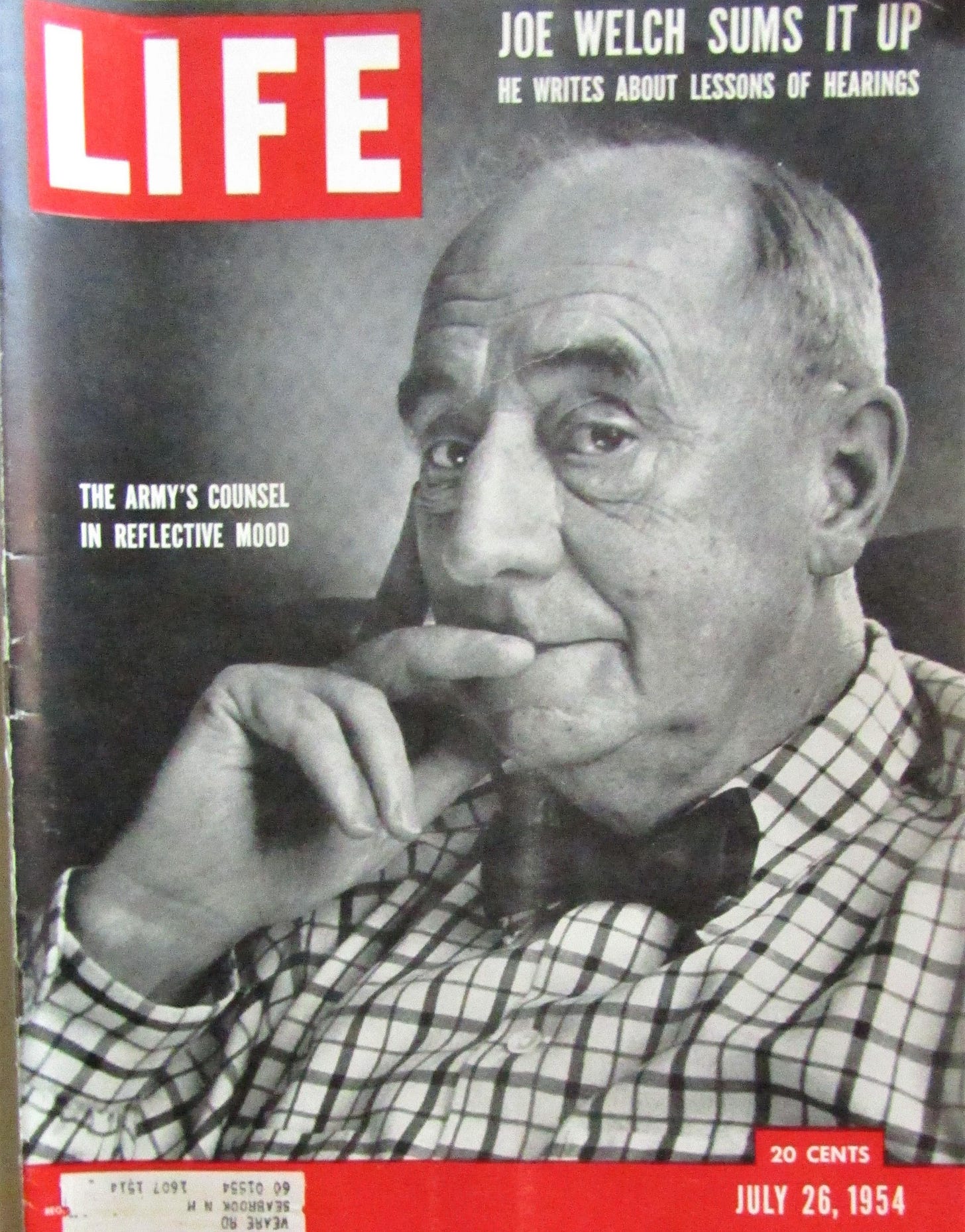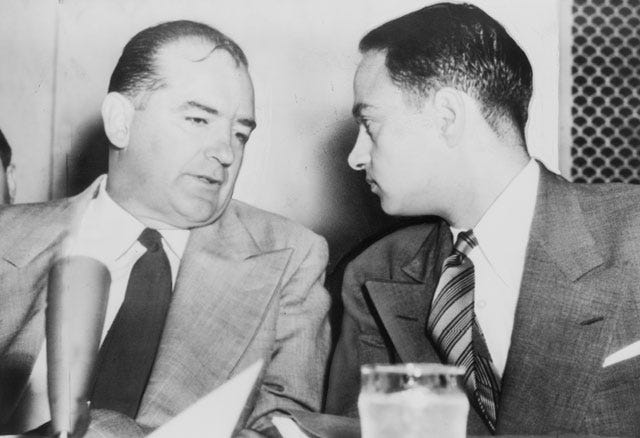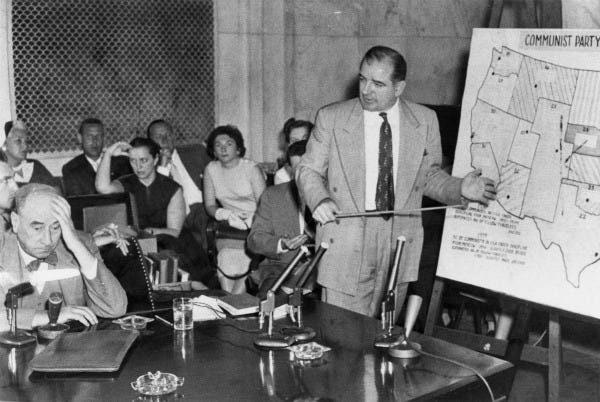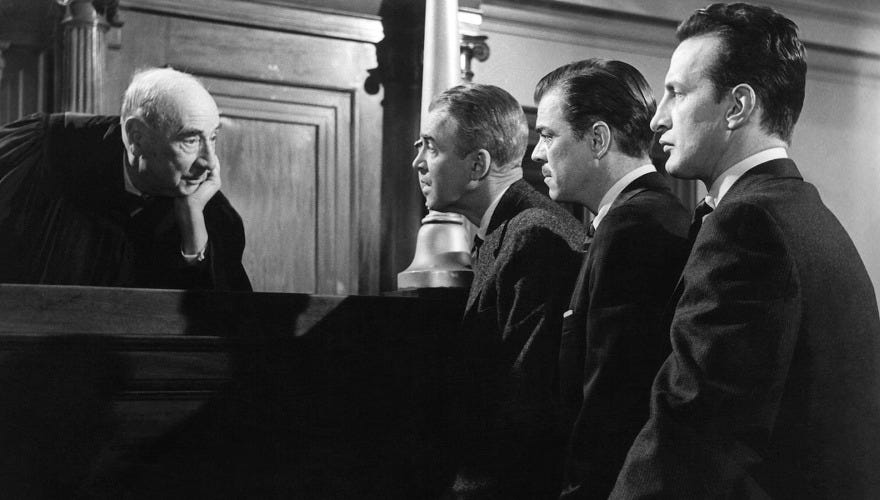Trump's role models: Joseph McCarthy and Roy Cohn
Joe Welch, a man with Cape connections, discredited demagogue McCarthy. Here's how he did it -- and next, why something comparable hasn't happened now.
He was a jowly bald guy wearing a bow tie, an attorney from Brahmin Boston law firm Hale & Dorr who spent his last years on Cape Cod. Nothing about Joseph Nye Welch was the stuff of celebrity, yet he became famous because in 1954 he took down a raging bully by the name of Joseph McCarthy.
How and why that happened matters again, because McCarthy’s allegations of Deep State “subversives” and “Communists,” intimidation and unfounded accusations that ruined lives and careers, were the precursor and even blueprint for many of Donald Trump’s attacks.
Amazingly enough, the same man guided them both: Roy Cohn.
What also matters is why someone comparable to Welch has not emerged today, why his success isn’t its own blueprint for how to insist on “decency,” demand respect for law and individuals, rally public opinion.
This 70-year comparison, McCarthy to Trump with Welch and Cohn at the fulcrum, captures profound ways American culture and collective consciousness have shifted. The fear: that those shifts are undermining tenets of what we call democracy.
But first, the history:
When Joe Welch stepped in as Special Counsel for the United States Army before a Congressional subcommittee in April, 1954, few people knew of him but many knew the stakes were high:
Senator Joseph McCarthy had created a formidable national movement charging that “Communists,” “subversives,” “red agents” and “pinkos” were employed and protected in and beyond the federal government; his sweeping, disparaging terms bear close similarities to today’s “woke,” “aliens,” “anti-Semitic academics,” “radical left lunatics,” “vermin,” and “enemy from within.”
McCarthy produced what he claimed were leaked lists and anonymous tips, tracking friendships and associations, rarely revealing sources or hard evidence. Even so, many people were “blacklisted” in Washington, Hollywood, and most places in-between, often for espousing left-leaning politics or talking to someone who did.
McCarthy did much of his damage running a subcommittee on “un-American activities,” his chief counsel a young lawyer named Roy Cohn. Cohn had a “close friend” and “consultant” who had been drafted into the army, G. David Schine. Cohn used McCarthy to insist on special treatment for Private Schine; one strange demand was that Schine have access to the private “Senators’ baths” on Capitol Hill.
Later it became clear that Cohn, who attacked homosexuality publicly, was gay and deeply closeted (though less so on trips to Provincetown).
When the US Army refused these demands from McCarthy and Cohn, the Senator responded per usual: He alleged that the army was trying to discredit him in retaliation for his investigations into “Communist infiltration.”
Powerful as McCarthy was, his decision to expand his witchhunt and go after the United States Army proved a fatal mistake.
The army brought in a team to defend itself (and discredit McCarthy) in hearings before a subcommittee McCarthy usually chaired, but couldn’t now. Special Counsel Welch came down from Boston, while a just-launched television network named ABC made a momentous decision:
Broadcast the hearings live, gavel to gavel.
That turned into 36 days, 32 witnesses, two million words of testimony. 80 million people reportedly watched some part, a huge percentage of the nation’s population, perhaps the first super-popular reality TV show.
The fulcrum moment came on day 30. Welch had already proven that McCarthy’s office doctored a photograph to make it appear that Schine had a close personal relationship with the US Army Secretary (others in a group shot had been cropped out). He also proved that a supposedly damning letter McCarthy claimed was written by FBI Director J. Edgar Hoover was a fake.
Welch demanded that McCarthy’s right-hand man Cohn turn over his purported list of 130 “subversives” in military and defense facilities “before the sun goes down.”
McCarthy instead attacked a young member of Welch’s law firm for once being a member of the National Lawyers Guild, what McCarthy called “a bulwark of the Communist Party.”
Welch, incensed, responded, "Until this moment, Senator, I think I never really gauged your cruelty or your recklessness."
When McCarthy refused to move on, Welch cut him off:
"Senator, may we not drop this? We know he belonged to the Lawyer's Guild ... Let us not assassinate this lad further, Senator; you've done enough. Have you no sense of decency, sir? At long last, have you left no sense of decency?”
Welch then walked out of the hearing, to applause in the gallery and across the nation.
McCarthy’s bullying and lying, Welch’s defense of a young colleague, turned national opinion. McCarthy still had adherents, but his popularity plummeted and the Senate turned against him, voting 67-22 for censure in late 1954. He died, disgraced, in 1957.
Joe Welch posed for the cover of Life Magazine, a national hero, later even playing a judge in an Otto Preminger Hollywood movie.
His middle name invokes links to an influential Colonial settler in Sandwich, Benjamin Nye (though likely from different family branches). Perhaps this contributed to Welch’s late-life decision to move to Harwichport. He died of a heart attack at Cape Cod Hospital in 1960.
A fascinating chapter in modern American history, but how does it speak to now? What similarities, differences, insights surface as we continue the descent into the second Trump term?
That’s for next week.
Not a paid subscriber yet? Now’s the time.
Support real local journalism and you’ll receive enterprising reporting, nuanced writing, strong perspectives, unique takes every week from Cape Cod and beyond.
So subscribe, keep me going:
https://sethrolbein.substack.com/welcome
And if you are into Instagram, want to see some additional material, maybe share the work, here you go:









I've been waiting for a Joe Welch breakthrough moment. But I don't know how any one person can break through the noise coming from all directions and devices and platforms. Our own Congressman Bill Keating did his part by defending Congresswoman Sarah McBride, but that moment got drowned out by the firehose of nonsense and cruelty coming from the current regime. We need our own "flood the zone" strategy, but then again, legacy media really isn't interested in anything but both-sidesing, outrageous headlines, and clicks. They don't appear to be interested much in the truth or real investigative journalism anymore. Democracy is dying in broad daylight.
When I bike from Brewster to Harwichport, I occasionally stop (at least once every summer) to pay homage to Speaker Tip O'Neill, who is buried with his wife in an attractive but not at all ostentatious grave in the Mount Pleasant Cemetery, accessible from Forest St (and overlooking a golf course). Now I'm wondering if I might look for the gravesite of Joseph Welch there. Do you know where he was put to rest?